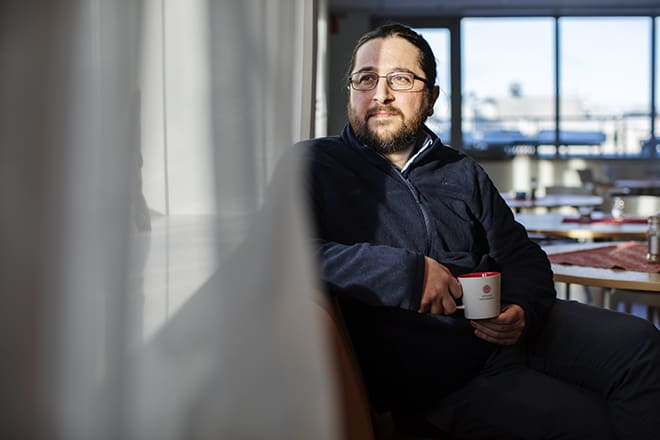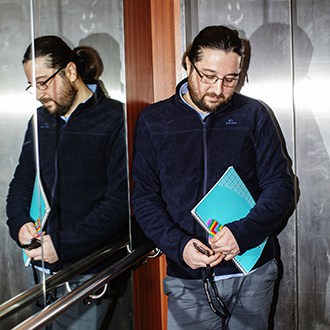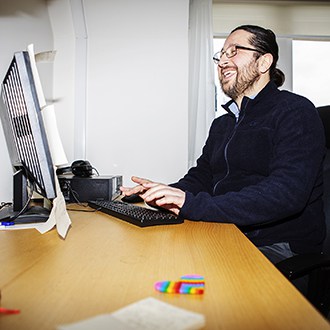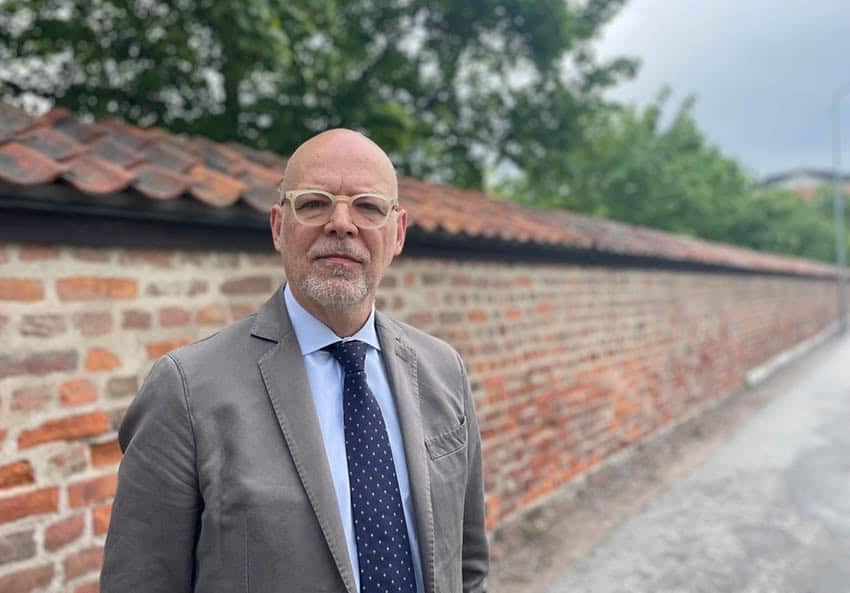The snowflakes glitter in the sun and seem to hang in the air in front of Uppsala Cathedral. Onur Can Taştan looks out at the two church towers through his office window at the Department of Political Science at Uppsala University. There are a couple of books on his desk. Some of the authors of one of them, Turkey’s New State in the Making (Zed Books, 2020), have, like himself, been fired after signing a peace petition in 2016.
He remembers how his stress levels fell when he and his wife İnan Özdemir Taştan came to Uppsala in August 2020; how it felt physically in his body.
“We knew that living in Turkey after 2016 was stressful, but we were not aware of how great the stress was until we came here,” says Taştan, who has a doctorate in labor economics and industrial relations.
In 2015, fighting began between Turkish state forces and the Kurdish PKK guerrilla in south-eastern Turkey. Taştan says that the government introduced curfews in the cities affected.
“A young girl died during the fighting, but due to the curfew, her family could not bury her and had to keep the body in their refrigerator. Another woman lost her life on the street and the family could not move her. They had to throw stones at dogs and birds for several days to protect the body.”
Signed a call for peace
In January 2016, a group of researchers and university teachers, Academics for Peace, drew up a petition urging the government to end the violence and start peace negotiations. More than 1,200 academics signed it. Onur Can Taştan did not sign. It is common for Turkish academics to write petitions and he thought it was hard to see that this particular one would make a difference.
But on the same day, a strong statement was issued by President Recep Tayyip Erdoğan condemning Academics for Peace. Prosecutors launched investigations into the academics regarding terror-related crimes. A criminal leader also made threats: “We will shed your blood and swim in it.” The number of signatories then increased rapidly to around 2,000. Onur Can Taştan and his wife, who has a doctorate in communication science, were two of them.
“When the threat came from Erdoğan and the mafia leader, there was no hesitation. I just signed. It was a question of supporting my colleagues and showing my support for the demands contained in the petition.”
Barred from work
Onur Can Taştan had been working as a research assistant at Ankara University for ten years. He describes the position as being on the pathway from PhD to senior lecturer. The work consisted of assisting teachers and doing some teaching of his own. He was involved in the trade union Eğitim-Sen and fought for improved working conditions for research assistants.
In July 2016, there was a failed coup attempt in Turkey. President Erdoğan declared a state of emergency and began ruling the country by decree. One of the decrees made it possible for the president to unilaterally appoint university vice chancellors.
On September 1 of the same year, a decree was issued with the names of thousands of people who were alleged to have links to terrorist organizations and were no longer allowed to have jobs in the state sector. In practice, they were banned from working and also lost their passports. Many of those who had signed the peace petition were on the list, including Onur Can Taştan, and later also his wife.
“Our dismissal was part of the government’s attempt to take control of the universities,” says Taştan.
The lack of academic freedom is nothing new, he says. Many colleagues at Ankara University were fired after the 1980 military coup. “But most came back to the university in the early 1990s. One of the first things we said when we ourselves were fired was ‘we will be back!’”
Since the coup attempt in 2016, approximately 150,000 public sector employees have been fired.
For the first six months, Onur Can Taştan received financial support equal to his previous salary. Half of this came from the trade union and half from a solidarity fund set up by colleagues at Ankara University. “It was heartening, not just because of the money but because I felt such strong solidarity and support around me.”
Came into contact with SULF
Onur Can Taştan started looking for funding abroad and was offered a postdoctoral position at the University of Göttingen in Germany, where he taught remotely. At the end of 2019, he met Karin Åmossa, head of research at SULF. She and two colleagues from Saco and Lärarnas Riksförbund, the National Union of Teachers in Sweden, were visiting Turkey as part of the project “Strengthening Academic Life in Turkey”.
After the meeting, Onur Can Taştan and İnan Özdemir Taştan discovered that the Swedish Institute had announced a pilot project for support for cooperation between Swedish organisations and Turkish academics. The application period was soon to expire and in order to participate they needed a host organisation. They contacted Karin Åmossa and Laila Abdallah, international secretary at Saco. One day before the deadline, Åmossa called Shirin Ahlbäck Öberg, professor of political science at Uppsala University, who agreed to be a co-applicant. Taştan, Åmossa and Abdallah quickly put together an application to study challenges for academic trade unions in Sweden and Turkey.
Got their passports back
In February, the couple suddenly got their passports back. Shortly afterwards, the decision came from the Swedish Institute that their application had been approved. Onur Can Taştan started work on the Turkish part of the study. But on March 11, the World Health Organization classified the coronavirus as a pandemic. Sweden introduced a ban on entry from countries outside the EU.
Onur Can Taştan and İnan Özdemir Taştan waited impatiently. She had also received a grant, from the Swedish Collegium for Advanced Study in the Social Sciences, SCAS, and been given a job there. On 2 July, the news came that the entry ban had been eased and people with residence permits were allowed to enter Sweden.
“The whole time at the airport in Ankara, I was expecting us to be stopped. It was only when we were in the air that I could relax.”
Different union worlds
Old election posters hang in the corridors of the Department of Political Science at Uppsala University. On one of them, the Social Democrats argue for five weeks of annual holiday. Onur Can Taştan realises that there are major differences between the contexts in which Swedish and Turkish trade unions operate. In Sweden, collective agreements are accepted and well-established within academia and trade unions cooperate with each other. This rarely happens among the Turkish unions, which are oriented politically to the right and to the left.
The Swedish atmosphere is peaceful, he thinks, and the unions have dialogue with the government. In Turkey, the work of trade unions that are not in alignment with the ruling party is more focused on protests and demonstrations.
“It has been common to take to the streets and protest against government reforms or for the rights of academics, often resulting in police interventions. In Turkey, the government does not have discussions with independent unions. We have to express our views in other ways.”
So far, he has mostly concentrated on the Turkish part of the study, focusing primarily on the last three decades.
“I’m trying to understand how we ended up where we are today. It’s interesting, but also difficult psychologically, especially when I look at what happened in the 2000s, the struggles that my colleagues and I have been a part of. A process that led to my dismissal and to an authoritarian transformation of society and higher education.
Similar development
Taştan has started reading about higher education reforms in Sweden and received statistics from SULF. This spring, he will conduct interviews with union representatives at various universities. There are people, he continues, who believe that the Swedish autonomy reform has reduced the influence of collegiate bodies.
“There is a similar development in Turkey, but it’s difficult to compare because we are undergoing the change under an authoritarian government. SULF also talks about problems such as precarious working conditions for young researchers and an increasing dependence on external funds. These are problems that you can see in many other countries too.”
The research funding from the Swedish Institute provides sufficient until June. Onur Can Taştan and İnan Özdemir Taştan are looking for new international grants. They have also applied to a Turkish commission to seek re-employment at Ankara University.
“Our situation is uncertain, but we have got used to it. We will be back!”


















